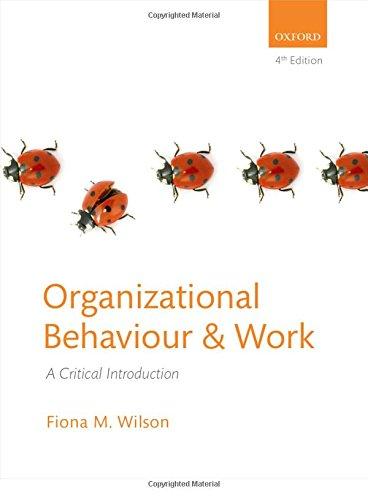The following is a real-life example of an individual who did some learning from experience at work.
Question:
The following is a real-life example of an individual who did some learning from experience at work.
Annabel Brown, an academic, was passed over for promotion in favour of afar less qualified male employee, whom she had recently helped recruit. The post had not been advertised, nor had selec¬ tion criteria been drawn up. She complained to the line manager, asked how the appointment could have been made in that way, and said that she felt that her qualifications, work experience, and cur¬ rent performance made her the best qualified for the role. Her manager suddenly proposed a U-turn solution: the original offer to the male colleague would be withdrawn, and she and the man would be left to decide who should have the job. Annabel turned this offer down, saying that she wanted an assurance from her department and the human resource department that, in future, all jobs would be properly advertised. The line manager referred Annabel to his manager, who made it clear that she believed that the case was clearly discrimination. She agreed that the appointment procedure had not been carried out properly. Annabel then asked the management to back down and advertise the post. By this time, the male colleague had a potential case for grievance, but agreed not to pursue it.
Because no acceptable solution could be reached, the post was withdrawn. Annabel was assured that all future posts would be advertised. The main lesson that Annabel learned was that, while her efforts were time-consuming and stressful, they did achieve a positive result. She would now rec¬ ommend others to challenge similar unjust appointments. She also learned that you should keep matters completely confidential. In her case, she spoke only to the union, to those colleagues who were directly concerned with the situation, and to her partner. By acting in this way, she ensured that no damaging gossip was spread around her institution. During the experience, she was better able to appear calm, professional, and rational—even though she may not have felt it. She managed to maintain good relations with her managers and her male colleague.
Questions
1. We have seen what Annabel learned—but do you think that the organization also learned some lessons from the experience, or can you say only that key individuals might have done so?
2. How would you decide whether or not organizational learning had taken place? What would need to happen?
Step by Step Answer:

Organizational Behaviour And Work A Critical Introduction
ISBN: 9780199645985
4th Edition
Authors: Fiona M. Wilson





